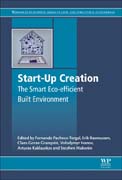
Start-Up Creation: The Smart Eco-efficient Built Environment
Pacheco-Torgal, Fernando
Rasmussen, Erik Stavnsager
Granqvist, Claes G.
Ivanov, Volodymyr
Kaklauskas, Habil Arturas
Makonin, Stephen
Start-Up Creation: The Smart Eco-efficient Built Environment provides a state-of-the-art review on high-technology applications and explains how these can be applied to improve the eco-efficiency of the built environment. Divided into four main parts, the book explains the key factors behind successful startup companies that grow from university research, including the development of a business plan, the importance of intellectual property, necessary entrepreneurial skills, and innovative thinking. Part Two presents the latest research findings on nano and bio-based technologies and their application and use to the energy efficiency of the built environment. Part Three focuses on the use of genetic algorithms, Big Data, and the Internet of Things applications. Finally, the book ends with an entire section dedicated to App development using selected case studies that illustrate their application and use for monitoring building energy-efficiency. Presents a definitive guide for startups that arise from college and university research, and how the application of advanced technologies can be applied to the built environmentIncludes case studies on new advanced technologies and apps developmentLinks startup creation to the eco-efficient built environment through software applications INDICE: 1. Introduction to start-up creation for the smart eco-efficient built environment Part One: Business plans, Start-up Financing, Marketing, Creativity and Intellectual Property Marketing 2. Business plan basics for engineers 3. Lean start-up: Making start-up more successful 4. Start-up financing 5. Marketing for start-ups 6. A Minimalist Model for Measuring Entrepreneurial Creativity in Eco-systems 7. Intellectual property Part Two: Nano and Biotechnologies for Eco-efficient Buildings 8. Nano-based thermal insulators for building energy efficiency 9. Nano-based thermal storage technologies for building energy efficiency 10. Nano-based chromogenic technologies for building energy efficiency 11. Façade integrated photobioreactors for energy efficiency 12. Biotechnologies for improving indoor air quality 13. Bioplastics for building façades Part 3: Algorithms, Big Data and IoT for Eco-efficient and Smart Buildings 14. Development of algorithms for building retrofit 15. The use of algorithms for light control 16. Big data and cloud computing for building energy efficiency 17. Intelligent decision support systems and the internet of things for the smart built environment 18. App programming and its use in smart buildings 19. Apps for smart buildings: a case study on building security
- ISBN: 978-0-08-100546-0
- Editorial: Woodhead Publishing
- Encuadernacion: Cartoné
- Páginas: 600
- Fecha Publicación: 01/06/2016
- Nº Volúmenes: 1
- Idioma: Inglés
